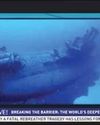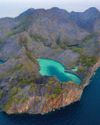Scrap tyres were once looked upon as a cheap and environmentally green way to recycle waste materials into usable habitats for underwater flora and fauna. Asian Diver looks into how submerged tyres are actually endangering marine and human life

In the middle of September this year, French authorities hired specially equipped boats with lifting gear to haul to the surface thousands of old tyres from artificial reefs. Researchers had discovered that the tyres were leaking toxic chemicals, including heavy metals, into the sea. This tyre reef sanctuary, located 500 metres from the Mediterranean coastline between the towns of Cannes and Antibes in the southeast corner of France, was created in the 1980s by dumping 25,000 car tyres into the sea after local fishermen and French authorities envisioned a protected area where fishing was banned and corals and marine life could populate the tyres, thereby rejuvenating the marine life in this stretch of the Mediterranean.
With increasing focus on the harmful effects tyres can have on the environment and the ocean, policymakers and tyre companies are becoming concerned. In addition to the toxicity from tyres submerged in water as stabilisers in breakwaters or as structures in artificial reefs, tyre waste transmitted through the air from vehicles on roads is also one of the issues being addressed by the European Commission in a White Paper drafted in January 2018 stating their strategy in dealing with plastics in a circular economy. Besides acknowledging that more research is needed to comprehend where microplastics come from and how they affect the environment and human health, the commission is looking into ways to cut down on microplastics that come from tyres. One of the ways they intend to do this is by looking into setting an EU-wide standard for the abrasion rate of tyres through establishing a common testing method along with a requirement for producers to inform consumers.
HOW TYRES GET INTO THE SEA
Esta historia es de la edición Issue 03 - 2018 de Asian Diver.
Comience su prueba gratuita de Magzter GOLD de 7 días para acceder a miles de historias premium seleccionadas y a más de 9,000 revistas y periódicos.
Ya eres suscriptor ? Conectar
Esta historia es de la edición Issue 03 - 2018 de Asian Diver.
Comience su prueba gratuita de Magzter GOLD de 7 días para acceder a miles de historias premium seleccionadas y a más de 9,000 revistas y periódicos.
Ya eres suscriptor? Conectar

The Sea Specialist: An Interview With Bret Gilliam
Most people learn to crawl before they walk, but there is a man who learned to swim before taking his first steps. Diver, entrepreneur, writer, athlete, maritime specialist – Bret Gilliam is the complete package. Just add water.

The Best Of Diving In Southeast Asia: Explore The Amazon Of The Seas
Southeast Asia encompasses the world’s most biodiverse reefs and some of the best diving anywhere on the planet. From the tiniest and rarest critters to huge fish schools and the biggest pelagics, the region has it all, and there’s something to suit divers of any level.

Below With David Doubilet & Jennifer Hayes
Best known for their work with National Geographic, David Doubilet and Jennifer Hayes came together to discuss their work with the youth, and, as Jennifer put it, “submerging with the emerging talent”.

Underwater Images For The Giant Screen
Howard and Michele Hall are best known for their success in underwater IMAX filmmaking.

Journey To Filming For National Geographic Wild Brazil
Cristian is an acclaimed and highly versatile Brazilian wildlife filmmaker who works both underwater and topside.

Breaking The Barrier: The World's Deepest Dive
David Strike shared a brilliant presentation about the history of deep diving and how Lt. George Wookey achieved the world’s deepest dive in 1956 using a surface-supplied rebreather.

Dive the Golden Land
The Best of Diving In Southeast Asia

OFFICIAL LAUNCH OF BLUE HOPE
Top Session of the Week (14,319 (Views) / 42,831 (Reach)

MEET THE (MARINE) MAMMALS
MEET THE (MARINE) MAMMALS

Fashion Faux Pas
What can be done to mitigate the impact of the garment industry on our oceans?